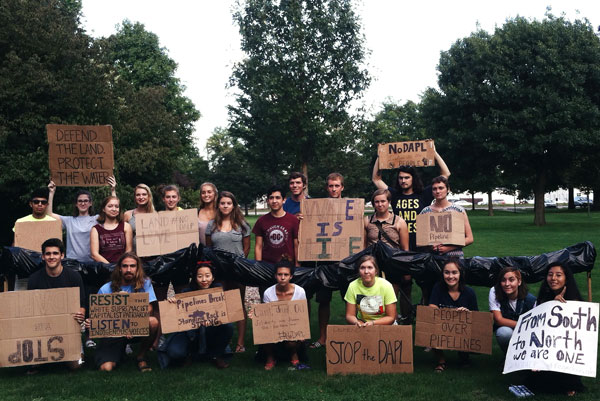In an effort to stand in solidarity with Standing Rock Dakota Access Pipeline protestors, Goshen College students organized a rally downtown on Saturday Sept. 17.
In July 2016, the U.S. Army Corps granted authorization of the Dakota Access Pipeline, a pipeline that will destroy cultural lands as well as endanger the tribal citizens’ access to clean water.The Standing Rock Sioux Reservation is currently home to members of the Dakota and Lakota nations. The reservation lies at the border of North Dakota and South Dakota, near landmarks such as Lake Oahe, a Missouri River reservoir. This area has been home to the Dakota and Lakota people for many years.
In its entirety, the Dakota Access Pipeline will be 1,100 miles long, constructed specifically to bring oil across four states and into Illinois. The construction route will come as close as one and a half miles to the Standing Rock Reservation, slashing through burial grounds and other sacrosanct areas.
The pipeline is set to cut directly through Lake Oahe, contaminating and destroying the reservoir the tribal citizens rely on for survival. None of this was listed on the U.S. Army Corps’ environmental assessment.
Laura Miller, a senior, is one of the students who stood with Standing Rock at the rally held by EcoPAX.
“[The pipeline] will affect millions of people’s drinking water all along the pipeline route throughout the Dakotas, Iowa, and Illinois,” said Miller. “And the truth of the matter is that pipelines break all the time. Look at what’s happening in Georgia right now or what just happened in Michigan not too long ago.”
Before the rally, students gathered in the Connector to make signs. The rally itself featured live music by Nayo Ulloa and a prayer walk from the courthouse back to campus, with students protesting and praying for the people of Standing Rock.
On the Standing Rock website, the tribe describes its opposition to the pipeline. “The Tribe opposes DAPL because we must honor our ancestors and protect our sacred sites and our precious waters,” said the Standing Rock Sioux Tribe.
The construction of this pipeline is also “ripe with colonialism, capitalism, racism, and violence,” said Miller.
The tribal citizens are a minority group within the United States (a group that has been oppressed and persecuted repeatedly throughout history). Specifically choosing the Standing Rock Reservation as a construction site for a dangerous pipeline directly places a minority group in danger.
The people of the Standing Rock Reservation have been protesting and demonstrating against the pipeline since its tentative introduction in 2014. As the pleas for change were ignored, the tribal citizens simply raised their voices.
The Tribe has been actively involved with the federal court, challenging the creation of the pipeline and have been joined by other Native American tribes in this effort.
A group entitled the Sacred Stone Camp has been formed in order to enforce constant protesting that is non-violent. Standing Rock youth ran nearly 2,000 miles to Washington, D.C., raising a petition to oppose the pipeline.
As of mid-September, it has been decided that construction of the pipeline will stop 20 miles from the Standing Rock Reservation, observing federal land laws. Although the people consider this to be a win, the Tribe, as well as many others who have joined them, will not stop fighting until the entire pipeline is banned.
This issue is not limited to the Dakota and Lakota people. It’s a matter of disregard for basic human rights, such as clean water and respect.
“This isn’t the end of our opportunities to stay involved,” said Miller. “Donate money, non-perishables, and hygiene products in the Church-Chapel that will go to Standing Rock. Go with GC students on fall break to North Dakota. Attend the Black Lives Matter protest on First Friday here in Goshen. Get involved right here in this community with issues of racism, environmental justice, sexism, and more.”



